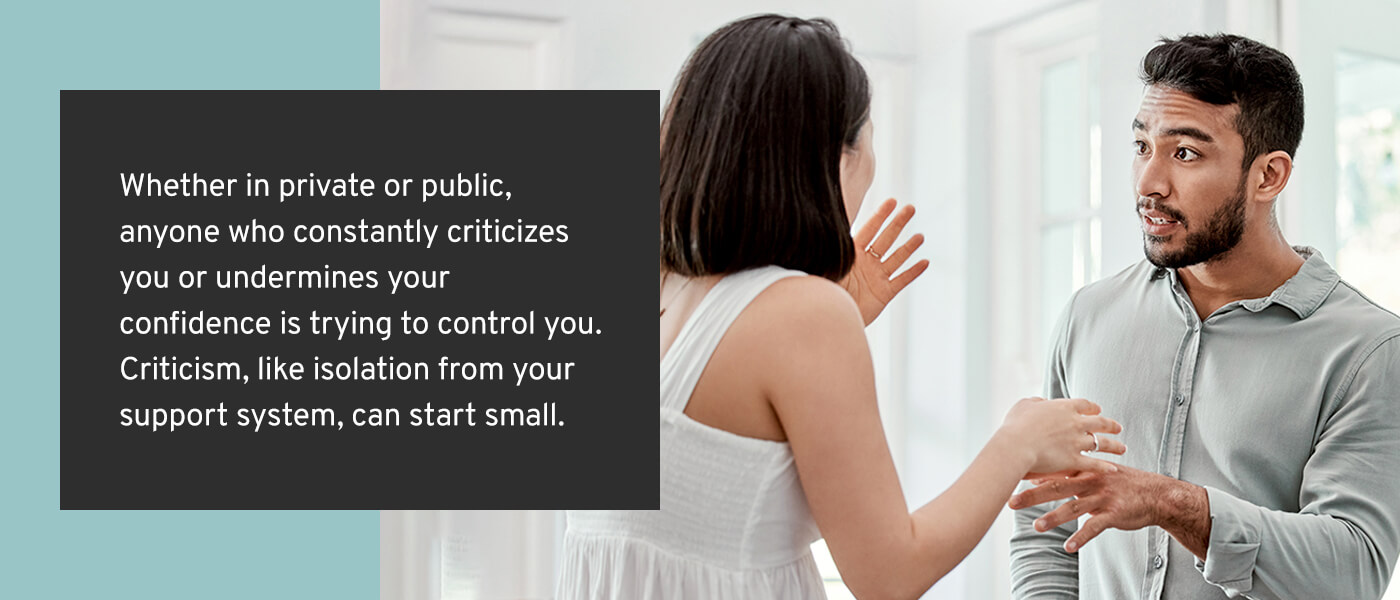Am I in a Controlling Relationship?
Being in a controlling relationship can be emotionally taxing. You might feel like everything you do in your relationship is never enough for the other person, no matter how hard you try. Your partner might even manipulate you into thinking you are the one causing the relationship strife.
Controlling partners are often very manipulative and cause you to doubt yourself constantly. As a result, you might be unsure whether you are in an unhealthy relationship. Here are signs of a healthy vs. abusive relationship, what to do if you’re in a controlling relationship and when to seek professional help.
Signs of a Controlling Relationship
A toxic relationship can sneak up on anyone. Controlling behavior knows no boundaries regarding gender, age, sexual orientation or socioeconomic status — anyone can display controlling behavior or get caught up in a controlling relationship. And while we may visualize a controlling partner as someone who is constantly belittling, physically aggressive or making ultimatums, some signs can appear quite differently.
Sometimes, the emotional manipulation can be so complex a person being controlled may start to believe themselves the villain. Whether the controlling behavior leads to emotional or physical abuse, any type of controlling relationship is a serious concern that you should not take lightly.
Here are a few signs you’re in a controlling relationship:
1. They Isolate You From Others
One signifier of a controlling relationship is your partner shaming you for spending time with friends and family. A controlling partner will often not support you in spending time with people you love. They will likely shame you for making plans that don’t involve them.
The signs can appear subtly in the beginning, but it’s often the first step a controlling person will make. For instance, they might complain about how often you talk to your mother on the phone or say they don’t like your best friend and don’t think you should spend more time with them. Over time, they might make it their goal to turn you against anyone you can rely on for support besides them.
Isolating you from your friends and family is a manipulative tactic to strip you of your support network, so you are less likely to stand up to them.

2. They Constantly Criticize You
Controlling behavior often looks like constant criticism. Your partner might comment on your flaws and make you self-conscious of your quirks. Whether in private or public, anyone who constantly criticizes you or undermines your confidence is trying to control you. Criticism, like isolation from your support system, can start small. In the beginning, you might even try to rationalize your partner’s behavior or see it as warranted.
You might think it’s not a big deal that your partner doesn’t like how you speak, dress or decorate the house and that these are minor problems. In reality, no matter how small the criticism may seem, if it becomes a constant dynamic in your relationship, this is a toxic situation. When you feel like every little thing you try to change is never appreciated, or you’re seen as always needing improvement in your partner’s eyes, you aren’t being valued as an equal.
3. Their Love Is Conditional
A controlling partner will make you feel you need to change to earn their respect. This can create a dynamic where you’re willing to work harder to make them happy — the ultimate goal of someone who wants to dominate a relationship.
With each change, you’ll likely see that nothing can satisfy them. For instance, they might tell you they’ll love you more if you get a promotion at work or find you more attractive if you work out. The message is that you don’t measure up to them and will never be good enough. These manipulation tactics only serve to control you in the relationship and can often worsen over time.
4. They Use Guilt as a Tool
If you are in a controlling relationship, you might notice that your partner is good at making your own emotions work in their favor. They’ll often manipulate you to feel constant guilt about everyday life, which can turn into gradually doing whatever you can not to feel guilty. Usually, this includes going along with whatever your partner tells you to do.
They might also use anger, such as degrading and nagging, to get you to do what they want. These are all manipulation tactics to get you to relent and give up all power to them.
Over time, your partner might even resort to gaslighting, where they twist your emotions around to make you question your own reality. For instance, if your partner does something that hurts you and you let them know, they may insist you are too sensitive. They might even get you to believe that you are the villain in the relationship, making it more difficult for you to see their faults and leave the relationship.
5. They Don’t Respect Boundaries
The biggest difference between a healthy vs. abusive relationship is that a healthy partner will always respect your boundaries. A controlling partner may feel they have the right to overstep boundaries constantly. They might spy on you or demand that you share everything with them. Disrespecting boundaries can also include snooping through your phone or computer and requiring constant discourse whenever you leave the house.
They may try to justify their behavior by saying that they have trust issues from a previous relationship or convince you that if you’ve done nothing wrong, you shouldn’t have a problem revealing your every move to them. No matter how they try to spin it, spying on you or requiring that you constantly tell them your whereabouts are signs that they don’t respect your boundaries.
You shouldn’t feel guilty or selfish for wanting space. Being yourself is the best thing for a healthy relationship dynamic, even if that means spending time with friends or on your own.
What to Do if You Are in a Controlling Relationship
If you recognize any of these signs in your relationship, it’s crucial that you take them seriously. Any type of controlling relationship can quickly turn destructive and lead to dangerous behaviors.
If you are in a controlling relationship, try the following steps to set boundaries or get support:
- Write down any relationship problems as they occur so you can refer to them if your partner attempts to gaslight you.
- Change the passwords on your devices, email accounts and social media accounts.
- Talk to a trusted friend or family member and keep in contact regularly.
- Reach out to a mental health professional.
- Encourage your partner to seek professional counseling.
- Leave the relationship if you feel unsafe.
A controlling partner might offer to change or make promises about the future that they’ll never translate into actions. Suppose they are unwilling to respect your boundaries no matter how hard you try, or you feel they are detrimental to your physical and mental health. In that case, it may be time to leave the relationship and seek professional help.
If You’re Experiencing Signs of a Controlling Relationship, We Can Help
Controlling relationships are toxic relationships. Controlling partners can cause you to constantly doubt yourself or feel unsure where to turn for help. At Taylor Counseling Group, we can help you recognize signs of controlling behaviors in your relationship and provide the support and compassion you need to heal.
Our knowledgeable and experienced counselors can also provide couples counseling to help you improve the health of your relationship. Whether you’re hoping for relationship advice or counseling for depression and anxiety, we can help.
When you’re ready to start your mental health journey, schedule an appointment today.






